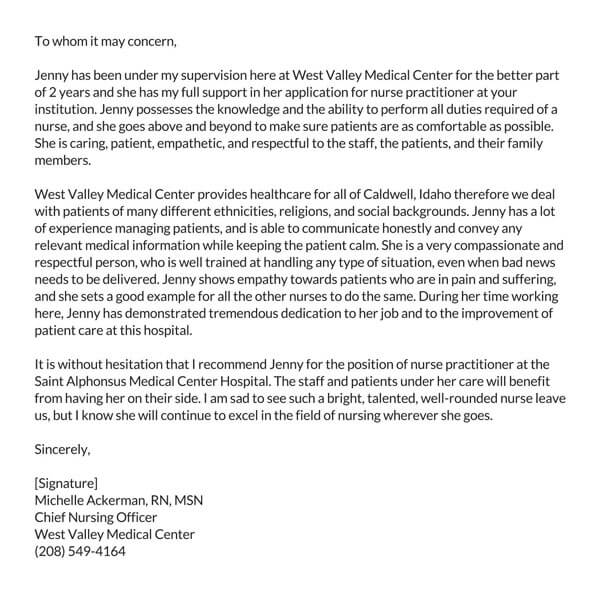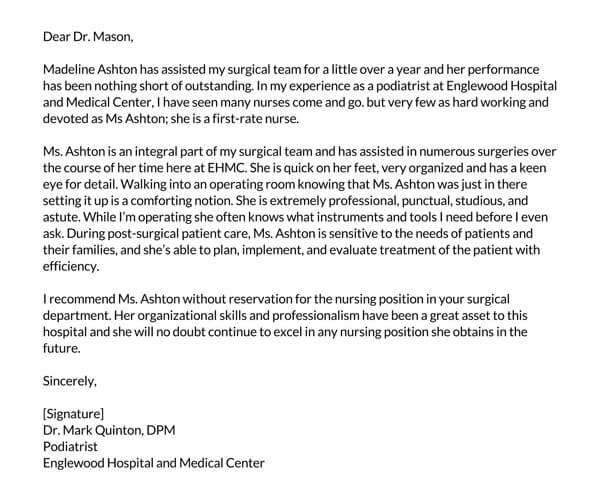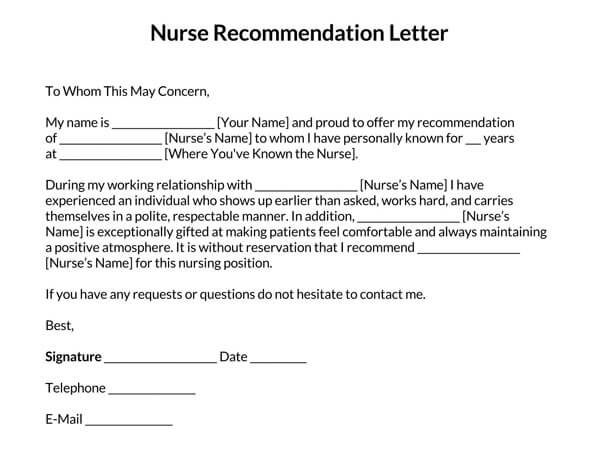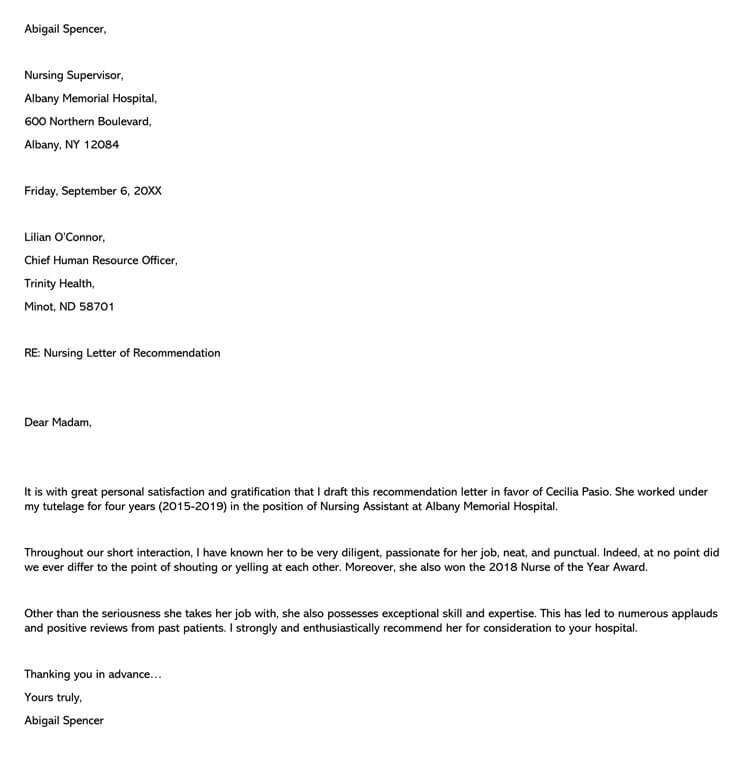A registered nurse (RN) letter of recommendation is a letter written to potential employers outlining the work ethic, professional ability and skills, and experience of a nurse applying for a nursing position.
This letter of recommendation for registered nurses is written to strengthen the nursing applicant’s application and boost their chances of securing the position. Sometimes it can be a requirement of the recruiting process, whereas else in other cases, it can be optional. This letter gives the employer or recruiting committee a chance to assess the nurse’s suitability from a third-party perspective. Also, it shows that the applicant did well at their previous job or in nursing school and provides reasons to support how the nurse is suitable for the job by providing examples and consequently the reason why the employer should hire them.
Registered nurse (RN) letters of recommendation are often written by professors, supervisors, administrators, or head nurses who interact with nurses or nursing students on a personal level.
tip
The longer the relationship between the recommender and the applicant, the more valuable a nursing reference letter will be, as it implies the recommender has had enough time to evaluate the nurse and give an informed opinion on his or her qualification to the potential employer.
Attaining a perfect nursing job is an enormous achievement in a nurse’s career; one should not compromise their chances of securing the job by writing a poor recommendation letter. Politely declining to write the recommendation if one is not well familiar with the nurse being recommended or believes they are not in a position to recommend the nurse is better than writing a sub-standard registered nurse (RN) letter of recommendation.
Free Templates & Examples








When is a Registered Nurse Recommendation Letter Used?
An RN recommendation can be used under different circumstances. The main areas where it is used include:
- Seeking a new job – Employers or management will often hold a recommendation with high regard when recruiting new nurses in a medical facility such as a hospital, clinic, or others.
- Applying for a scholarship – Nurses will often try to further their knowledge to progress in their careers, earn more, or get promoted. Nurses who apply for scholarships for this purpose will often require a registered nurse letter of recommendation to strengthen their application.
- Protesting de-registration – Nurses are allowed to defend themselves before being deregistered. A well-crafted (RN) letter of recommendation can rescue him or her career.
- Anticipating a Promotion – A nurse who anticipates a promotion will also rely extensively on this letter. The purpose of the letter is to explain to the employer how suited or deserving she might be for the promotion. This letter also unravels the past experiences of the nurse in question.
- Government Agencies: It is the task of the government agencies to register, appraise, and deregister nurses. They may need such a letter before taking an appropriate course of action. For instance, they might seek a recommendation to show cause why a nurse ought not to be de-registered.
Writing a Nursing Reference Letter
The recommendation letter strengthens the position of a nurse. It does so mainly by demonstrating how the nurse in question deserves to be considered for the position applied for, the scholar being sought, and so on. It mainly reveals the experience of the nurse as well as her suitability for the same.
Writing an exemplary (RN) letter of recommendation gives the recommended nurse a chance to stand out from the numerous applications sent to employers in the nursing sector. Where the contents of a nursing reference letter are always unique and specific to the applicant, they should be categorized into several sections that make up a nursing reference letter.
The basic components of this letter of recommendation include an introduction, specific qualifications and skills, non-clinical skills, examples, and a conclusion. These are explained as follows:
Step 1: Craft a strong introduction
First and foremost, the recommender should introduce themselves, and the nurse being recommended, and state the nature of their relationship. An introduction states how and where the recommender interacted with the nurse and for how long. The introduction should be brief and to the point, about 2-3 sentences.
EXAMPLE
I am the Head Nurse at St. John’s Medical Hospital, and I write this letter in favor of Peggie Williams. I am very honored to have worked with Ms. Williams from 2015-2019 (four years) at St. John’s, where she worked as my deputy.
With great joy and admiration, I am writing this recommendation letter on behalf of Henry Sanders for the nursing position at your organization. Mr. Sanders has been under my guidance for three years (2018-2020) at Hope Memorial Nursing School.
tip
Recommenders should be anyone professionally related to the applicant, such as co-workers, patients, etc. However, physicians and nursing practitioners are regarded as better referees. Other options include hospital managers, previous inspectors, and human resource executives.
Step 2: Mention skills and qualifications
In the next paragraph, the RN letter of recommendation should outline the nurse’s skills and qualifications/abilities in their professional and non-professional capacities. Information that can be provided in this section should be qualitative and quantitative; this includes positions the nurse has previously held, tenure of employment, and academic qualifications if necessary. Try to relate the skills and qualifications to the application requirements.
EXAMPLE
She is very quick to respond to emergency cases when called upon. She is known to implement treatment instructions issued by doctors precisely. She administers IV fluids in the proper concentrations and takes detailed medical histories of her patients.
Harry is competent in assisting with surgical procedures, pediatric surgeries being his most preferred. He is familiar with emergency ER protocols and very competent when it comes to checking and monitoring a patient’s vital signs. Doctors in your institution will undoubtedly appreciate the helping hand he brings to the table.
Where there is no specific example to share, one should discuss the non-technical skills the nurse possesses.
EXAMPLE
Henry has been an observant student who is quick to learn. He demonstrates a high level of professionalism when carrying out his duties. He is a team player and has excellent written and verbal communication skills, which are very imperative in nursing.
Throughout her tenure at Brownsville Memorial Hospital, Mrs. Howard has been an excellent timekeeper and organized staff member. She never loses patient records and has been a preferred assistant to many doctors within the institution. Her compassion has seen her interact with patients regularly and uplift their spirits. She was a Brownsville Memorial Nurse of the Year award recipient for the year 2019.
As his supervisor, I have known Danny as diligent, competent, and passionate about his job. He is well-organized and ethical. He always ensures things are where they need to be and observes high hygiene standards during his shifts.
tip
Other non-technical skills to consider are teamwork, dependability, confidentiality, verbal and written communication skills, and problem-solving and critical thinking skills.
Subsequently, the recommender should give examples of how the nurse demonstrated the outlined skills and cases where he or she demonstrated exceptional skills. This should be done narratively. The recommender should write this section from their point of view, that is, what the story illustrated to him or her.
EXAMPLE
In 2018, Mrs. Smith was among ten staff members of Oak Creek General who volunteered as a response team for the unfortunate fire outbreak in Long Beach Estate. The team spent 16 hours attending to victims on the scene, which saw a significant reduction in the mortality rate.
Adam is a counselor at the hospital. He holds a 30-minute counseling session every Friday to coach patients on life, spirituality, and self-esteem. His lessons have been reported to be helpful in mental health patient recoveries.
Step 4: Conclude properly
Finally, the recommender should provide a concise conclusion reaffirms why it would be in the employer’s best interest to select the recommended applicant for the position. A conclusion of 2-3 sentences will normally be sufficient. A formal complimentary close such as “sincerely” or “warm regards” should follow the signature.
EXAMPLE
Peggy will be a valuable addition to your team, as she has been with us. I highly recommend her for the Head Nurse position. Do not hesitate to reach me at example@email.com if you have additional questions.
Yours sincerely.
Karl Sheraton,
Head Nurse, Maykins Hospital
With great honor, I’m recommending Mr. Banks for the nursing position being offered at your institution. He is a dedicated nurse and is known to bring the best out of those he works with. Kindly contact me at example@email.com if there are further queries.
Sincerely,
Halley Bean,
Human Resource Manager
Registered Nurse Recommendation Letter Template
[Your Name]
[Your Job Title, e.g., Senior Nurse Manager]
[Your Workplace, e.g., Springfield General Hospital]
[Workplace Address]
[City, State, Zip]
[Your Email Address]
[Your Phone Number]
[Date]
[Recipient’s Name or “To Whom It May Concern”]
[Recipient’s Job Title or “Hiring Manager”]
[Facility Name, e.g., City Hospital]
[Facility Address]
[City, State, Zip]
Dear [Recipient’s Name or “To Whom It May Concern”],
I am writing to wholeheartedly recommend [Nurse’s Name], who served as a Registered Nurse at [Your Workplace, e.g., Springfield General Hospital] for [mention years of experience, e.g., “over three years”], for the Registered Nurse position at [Facility Name]. Throughout [his/her/their] tenure with us, [Nurse’s Name] has exemplified the highest standards of professionalism, compassion, and clinical excellence, making [him/her/them] a valued asset to our nursing team and a beloved caregiver by our patients.
[Nurse’s Name] possesses a profound understanding of nursing practices, patient care, and healthcare protocols, which [he/she/they] applies with adept skill in [his/her/their] daily duties. [His/Her/Their] dedication to providing the highest level of care is evident in everything [he/she/they] does, from [mention specific duties or achievements, e.g., “administering medications accurately and efficiently, to developing patient care plans that address both medical and emotional needs”].
One of [Nurse’s Name]’s most commendable qualities is [his/her/their] exceptional ability to communicate with patients, families, and healthcare professionals. [He/She/They] consistently demonstrates empathy and understanding, offering support and information to ensure that patients are informed and comfortable with their care. This has not only improved patient satisfaction but also facilitated a collaborative and harmonious work environment within our team.
[Nurse’s Name] is also highly committed to professional development and staying abreast of the latest in nursing and healthcare innovations. [He/She/They] has participated in [mention any additional certifications, training, or conferences, e.g., “advanced cardiac life support (ACLS) certification and attended several seminars on innovative patient care techniques”], which have further enhanced [his/her/their] nursing skills and knowledge base.
In addition to [his/her/their] clinical competencies, [Nurse’s Name] exhibits remarkable leadership qualities. [He/She/They] has led [mention any specific projects or teams, e.g., “a task force aimed at improving nursing documentation practices”], contributing to significant improvements in our operational efficiency and patient care standards.
I am confident that [Nurse’s Name] will bring the same level of dedication, expertise, and passion for nursing to [Facility Name] as [he/she/they] has consistently demonstrated at [Your Workplace]. [His/Her/Their] ability to blend scientific knowledge with compassionate care makes [him/her/them] an exceptional candidate for the Registered Nurse position.
Please feel free to contact me at [Your Phone Number] or via email at [Your Email Address] should you require any further information or insights regarding [Nurse’s Name]’s qualifications and achievements. I am eager to see [him/her/them] continue to excel in [his/her/their] nursing career and have no doubt that [he/she/they] would be an invaluable addition to your team.
Sincerely,
[Your Name]
[Your Job Title]
[Your Workplace]
Nursing Recommendation Letter Sample
To Whom It May Concern,
I am honored to write this letter of recommendation for Emily Johnson, BSN, RN, who has served under my supervision as a Registered Nurse at City Central Hospital for the past five years. Emily has consistently demonstrated exceptional skills, unwavering commitment, and a deep passion for providing outstanding patient care, making her an invaluable asset to our medical team and a trusted advocate for her patients.
Throughout her tenure, Emily has exhibited a high level of clinical expertise, effectively managing complex patient cases with professionalism and care. She possesses a thorough understanding of nursing procedures, patient care standards, and healthcare protocols, which she applies proficiently in her daily responsibilities. Emily’s ability to quickly assess patient needs and respond with appropriate interventions is remarkable and has been critical in emergency situations, ensuring the safety and well-being of our patients.
Emily’s dedication to patient care goes beyond her clinical duties. She is deeply compassionate, consistently going the extra mile to ensure her patients feel comfortable, understood, and respected. Her excellent communication skills have enabled her to build strong relationships with patients and their families, providing them with emotional support and education about their health conditions and treatment plans. This has not only improved patient outcomes but also enhanced the overall patient experience at our hospital.
Furthermore, Emily is a natural leader and a team player. She has been instrumental in mentoring new nursing staff, and sharing her knowledge and experience to foster a collaborative and supportive work environment. Emily’s positive attitude and ability to inspire others have significantly contributed to the development of a cohesive and efficient nursing team.
Emily is also committed to her professional development and staying abreast of the latest advancements in healthcare. She has participated in various continuing education programs and workshops, which have enriched her practice and enabled her to bring innovative approaches to patient care.
In summary, Emily Johnson is a highly skilled and compassionate nurse whose dedication to her profession and her patients is exemplary. I have no doubt that she will continue to excel in her career and make significant contributions to the field of nursing. Emily would be a tremendous asset to any healthcare facility, and I wholeheartedly recommend her for any position she seeks.
Should you require any further information, please do not hesitate to contact me.
Sincerely,
Dr. Lisa Monroe
Chief of Medicine
City Central Hospital
Nursing Recommendation Letter Sample Email
Subject: Strong Recommendation for Jane Doe – Registered Nurse Position at Mercy Hospital
Dear Dr. Smith,
I hope this email finds you well. I am reaching out to highly recommend Jane Doe for the Registered Nurse position in the Pediatrics Department at Mercy Hospital. Having worked with Jane for over four years at Springfield Community Health Center, I have witnessed firsthand her exceptional skills, unwavering compassion, and dedication to providing exemplary patient care.
Jane stands out for her ability to handle complex and high-pressure situations with grace and professionalism. Her clinical skills are top-notch, with a particular strength in pediatric care that makes her an ideal fit for your team. She has a natural rapport with children and their families, providing comfort and clarity during their most challenging moments. Her patient advocacy is unparalleled; she consistently goes above and beyond to ensure her patients receive the best possible care.
Beyond her clinical abilities, Jane’s communication skills are exemplary. She has a gift for breaking down complex medical jargon into understandable terms for patients and their families, ensuring they are informed and comfortable with their care plans. Her collaborative spirit has made her a valued team member, always ready to lend a hand or share her knowledge with colleagues.
Jane is also committed to her professional development. She has pursued additional certifications, including Advanced Cardiac Life Support (ACLS) and Pediatric Advanced Life Support (PALS), which have greatly benefited our practice. Her enthusiasm for learning and growth has inspired many in our team to seek out further education and training opportunities.
Furthermore, Jane’s leadership skills shone brightly when she led the initiative to revamp our pediatric care procedures, significantly improving our efficiency and patient satisfaction. Her ability to manage projects, alongside her capacity to inspire and motivate her peers, speaks volumes about her potential contributions to Mercy Hospital.
I am confident that Jane will bring the same level of excellence, compassion, and dedication to the Registered Nurse position at Mercy Hospital. Her professional and personal qualities make her a standout candidate who will undoubtedly exceed your expectations and make a significant impact on the Pediatrics Department.
Please feel free to contact me at dr.jones@email.com or 555-123-4567 should you require any further information or wish to discuss Jane’s qualifications and achievements in more detail. Thank you for considering my recommendation.
Best regards,
Dr. Emily Jones
Senior Nurse Practitioner
Springfield Community Health Center
dr.jones@email.com
555-123-4567
Analysis
In the first letter of recommendation, the author, a Chief of Medicine at City Central Hospital, provides a comprehensive endorsement for a Registered Nurse. The letter highlights the nurse’s exceptional clinical skills, compassionate patient care, leadership qualities, and commitment to professional development. It effectively communicates the nurse’s strengths and contributions to the medical team, making a strong case for their suitability for any nursing position they may pursue.
In the email sample, a Senior Nurse Practitioner offers a glowing recommendation for another Registered Nurse, emphasizing their outstanding clinical abilities, compassionate patient care, excellent communication skills, leadership qualities, and commitment to professional development. The email provides specific examples of the nurse’s contributions and accomplishments during their time working together at Springfield Community Health Center, underscoring their suitability for the position at Mercy Hospital. The email format allows for a concise yet detailed presentation of the nurse’s qualifications and achievements, making it an effective means of communication for professional recommendations.
In conclusion, both the letter and email samples effectively showcase the exemplary qualities and contributions of the recommended Registered Nurses, underscoring their suitability for positions in healthcare settings.
Final Thoughts
A registered nurse’s (RN) letter of recommendation is written to bolster a nurse’s application by outlining the best skills and qualifications that would make them a good fit for a specified opportunity. It is meant to market the nurse. This letter of recommendation will usually contain the sender and recipient’s information, an introduction, skills and qualifications, examples of how the applicant utilizes the skills at work, and a conclusion.












